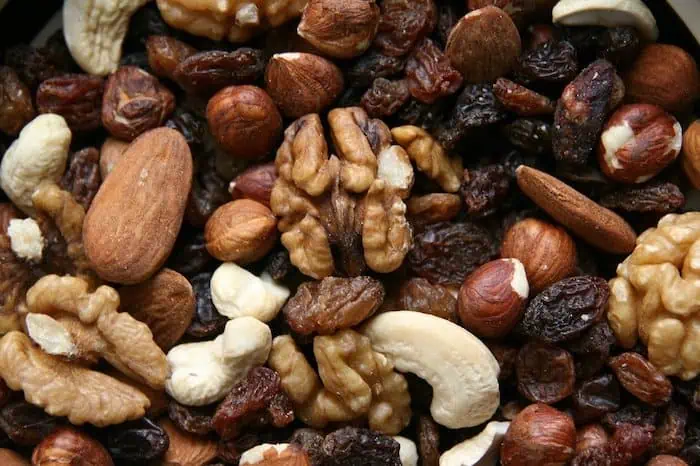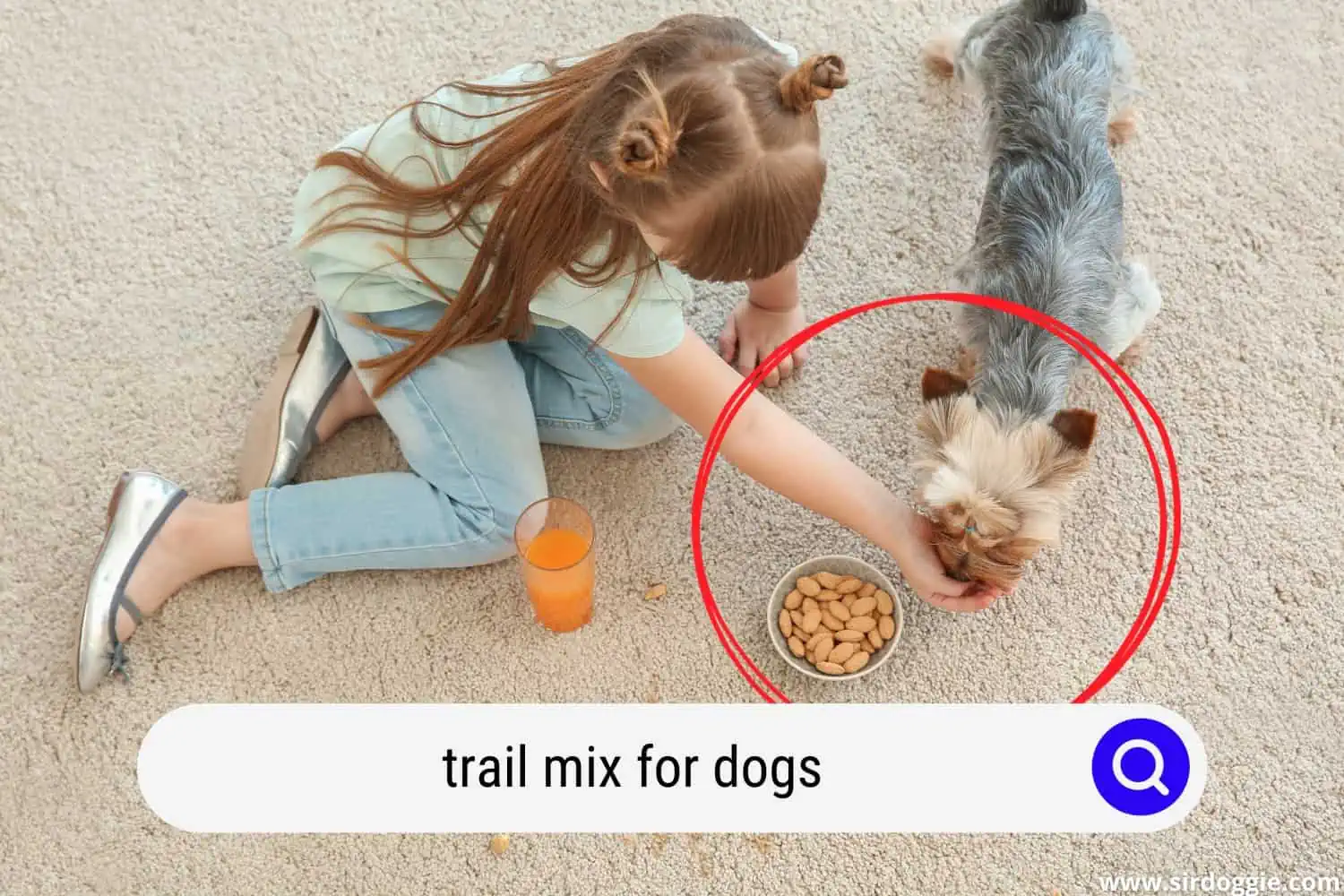Can Dogs Eat Trail Mix? (Detailed Explanation)
Trail mix is a very popular portable snack that packs plenty of energy, nutrition, and good taste. It’s also handy for people who like to hike or camp because it doesn’t need refrigeration and doesn’t spoil easily. The ingredients in trail mix contain a variety of things, but most trail mix recipes contain raisins, nuts, seeds, dried fruit, and sometimes chocolate.
Lots of dog owners love hiking and camping with their dogs and may be tempted to share some of that trail mix with their best friend. But can dogs eat trail mix? Although dogs are omnivores, some of the ingredients in trail mix are actually not good for dogs.

Can Dogs Eat Trail Mix?
The answer to this question depends on what is in the trail mix. Most commercial trail mixes contain raisins, dried currants, almonds, walnuts, pistachios, macadamia nuts, pecans, and even artificial sweeteners. Some of these ingredients can cause gastrointestinal (GI) upset, while others can be toxic to dogs, causing a variety of complications including pancreatitis, liver and kidney damage, and even seizures and other neurological signs.
If you make your own trail mix, it’s best to avoid adding certain ingredients, and if you purchase a commercial trail mix, it’s important to read all the ingredients before sharing some with your pooch.
What Ingredients in Trail Mix can Hurt my Dog?

There are several foods that you should avoid giving your dog when it comes to trail mix, and these are listed below.
- Raisins
Raisins are a popular ingredient in trail mix, but unfortunately, they can cause kidney failure in dogs. However, kidney failure does not happen in all dogs that have eaten grapes or raisins, and veterinarians have noted that raisins don’t affect all dogs the same way. Some dogs may be more sensitive than others. Also, there is no definite number as to how many raisins are toxic to a dog.
In any event, raisins should never be given to your dog, because you don’t know how your dog will react. Symptoms of raisin toxicity include vomiting, diarrhea, loss of appetite, dehydration, increased thirst, and abdominal pain. If you think that your pup has eaten raisins, contact your veterinarian right away. - Currants
Some trail mixes may contain currents, which like raisins, should never be given to your dog because they can potentially cause kidney failure as well. Veterinarians suspect that they may contain a mycotoxin (a toxin created by a fungus or mold), and others suspect that an aspirin-like drug may be naturally found in raisins and currants, causing decreased blood flow to the kidneys. - Macadamia nuts
Macadamia nuts can be toxic to dogs. Dogs who have ingested these nuts can experience weakness in the back legs, vomiting, diarrhea, and a fever. It only takes a dose of about two nuts per pound of body weight to result in poisoning, leading to the temporary inability to walk. Scientists have yet to discover what substance in macadamia nuts causes toxicity in dogs, but the effects can be alarming. If you think your dog has eaten macadamia nuts, contact your veterinarian immediately. - Almonds
Almonds are also a popular ingredient in trail mix, and although they are not toxic to dogs, they are not easily digestible and can cause gastrointestinal (GI) upset and even pancreatitis. Also, almonds can be a potential choking hazard, and it’s important not to give your pup salted, sugar-coated, seasoned, or chocolate-covered almonds. - Pine Nuts
Pine nuts are high in fat and phosphorus, and although these popular nuts are not toxic to dogs, they can cause some gastrointestinal (GI) irritation, even if eaten in small amounts. If your furry friend has eaten a lot of pine nuts or eats them frequently, she may eventually develop pancreatitis as a result of GI irritation. Pancreatitis can be a deadly condition for a dog, and treatment often involves hospitalization and supportive care on intravenous (IV) fluids, - Pistachios
Another trail mix ingredient is pistachios. These tasty green nuts are a favorite, but they can be harmful to your dog. Pistachios can carry a mold called “Aspergillus,” and this mold produces aflatoxin (a poisonous carcinogen) that can damage your dog’s liver. Pistachios can also pose a choking hazard to your pup, and their high-fat content can cause potential GI upset and pancreatitis. Dogs who have ingested pistachios can show signs of GI distress such as vomiting, diarrhea, and abdominal pain. - Cashews
Cashews are another ingredient in trail mix, and one cashew or two won’t be harmful to your pup. However, if you share a cashew or two with your dog, make sure that it’s unsalted and roasted or baked. Cashews come from the same botanical family as poison ivy and sumac, and some dogs may have an allergic reaction to these nuts. Allergic reactions include itching, swelling, and hives on the skin. These tasty nuts also contain high amounts of fat and calories, so they may not be the best for your pet. - Walnuts
Like pistachios, walnuts should not be fed to your dog, and in addition to GI upset and irritation, they can contain mycotoxin molds that can cause tremors and seizures. Black walnuts in particular are especially toxic to dogs. They contain a compound that can cause weakness, paralysis, and even death. If your dog has eaten black walnuts, contact your veterinarian immediately. - Pecans
Pecans are also a tasty addition to any trail mix, but like pistachios, they can also contain the Aspergillus mold, which can cause liver damage. Pecans can also pose a choking hazard, produce GI irritation, and cause possible intestinal blockages. - Chocolate
Many trail mixes contain chocolate in the form of chocolate chips, M&Ms, Reeses Pieces, and other chocolaty treats, however, never give your dog chocolate. Chocolate is toxic to dogs because it contains methylxanthine and theobromine. These elements are found in tea, coffee, and chocolate, and both stimulate the nervous and cardiovascular systems. Because of these chemicals, chocolate ingestion in large quantities can cause vomiting, liver failure, and even death in dogs.
Dark chocolate is the most toxic because it has a higher concentration of methylxanthine and theobromine. Toxicity depends on the type of chocolate ingested, the amount ingested, and the size of the dog. For example, in small dogs, just half an ounce of dark baking chocolate can be fatal, while a larger dog may be fine after eating the same amount or a few ounces more. If you suspect that your dog has eaten chocolate, contact your veterinarian or a pet poison hotline immediately. Treatment often involves the induction of emesis (vomiting) and supportive care. - Xylitol
For those individuals who are watching their weight, but wish to reduce their sugar intake, they may opt to put the artificial sweetener Xylitol into their trail mix. Xylitol is an artificial sweetener found in several food items such as gum and other sugar-free foods, however, Xylitol is dangerously toxic to dogs. Even a tiny amount can cause serious hypoglycemia (low blood sugar), seizures, liver damage, and even death. If your dog has eaten Xylitol or has ingested food sweetened with Xylitol, that is a medical emergency, and you should contact your veterinarian immediately.
What About All the Other Good Stuff in Trail Mix?

We discussed the above possible harmful ingredients in trail mix, but what about other ingredients? Trail mixes can contain a host of other ingredients, such as pumpkin seeds, popcorn, granola, oats, dried bananas, blueberries, lentils, chickpeas, and dried mangos. These items are perfectly fine for your dog, but just be aware that they may contain a lot of sugar, which is not necessarily good for your pup. Although it’s not harmful to offer your best friend a little nibble of these ingredients, it’s probably best to keep these snacks to yourself.
What Should I Do If My Dog Eats Trail Mix?
If you suspect that your dog has gotten into your trail mix, contact your veterinarian or a pet poison hotline for information. It is important to act quickly, especially if your dog has ingested raisins, walnuts, or Xylitol. Have the bag of trail mix handy, or provide a list of ingredients for your veterinarian so that he/she can treat your dog appropriately.
What Are the Symptoms of Raisin Toxicity?
Since raisins are a favorite ingredient in trail mix, it’s important to note symptoms of raisin toxicity. The most common and early symptoms include vomiting, lethargy, lack of appetite, and diarrhea. Most of these symptoms appear within 12-24 hours, however, more severe signs may not appear for 48 hours.
Severe signs often include the first symptoms of kidney failure, which are nausea, lack of appetite, vomiting, diarrhea, abdominal pain, increased thirst and urination, and a metallic smell to the breath. As the kidneys shut down, a dog may not be able to produce any urine, and in this case, the prognosis is poor, and can most likely be fatal.
How is Trail Mix Poisoning Diagnosed?
The symptoms of raisin, walnut, or aflatoxin poisoning are often non-specific and are similar to the signs of kidney failure and liver failure. A veterinarian can base a diagnosis on what was ingested, or after inducing vomiting and inspecting the vomit. A veterinarian can also conduct diagnostic tests such as a complete blood count (CBC), a serum biochemistry profile, and a urinalysis to assess kidney and liver function.
How is Trail Mix Poisoning Treated?
If your dog has ingested trail mix that contains raisins, Xylitol, cashews, pistachios, or black walnuts, treatment will first involve inducing vomiting (emesis) to rid the stomach of its contents. Then, the veterinarian may administer activated charcoal to block further systemic absorption of the toxins. Following emesis and the administration of activated charcoal, most veterinarians will recommend hospitalization on IV fluids to flush the toxins out of the kidneys, as well as the management of blood pressure and blood flow to the kidneys.
If liver damage is suspected, supportive care on IV fluids will also be recommended, as well as the administration of liver support supplements and medications. Depending on the ingredient and the amount ingested, hospitalization may take up to 2-7 days. During this time the veterinarian will monitor kidney and liver values daily to assess the response to treatment.
What is The Prognosis Following Trail Mix Ingestion?
The prognosis depends on many factors, such as what was ingested, the size of the dog, how fast the dog was treated, and if the pet has a pre-existing liver or kidney condition. For example, if your dog ate just a few raisins, and you rushed her to the veterinarian immediately, the prognosis is very good. In any event, it’s always best to consult your veterinarian if you have questions about trail mix ingestion and your dog.
What are Pet Poison Numbers?
In the US, there are several numbers pet owners can call in the event of possible toxin ingestion. One is the Pet Poison Helpline, an animal poison control service available 24 hours, seven days a week for pet owners and veterinary professionals. Pet Poison Helpline may charge a consultation fee and is available in North America by calling (800) 213-6680. Additional information can be found online at www.petpoisonhelpline.com.
Another is the Pet Poison Helpline, (855) 764-7661. They are available 24/7 and often charge a consultation fee of $65. More information can be found at www.petpoisonhelpline.com.
Dog owners can also call the ASPCA (The ASPCA Animal Poison Control Center) for any animal poison-related emergency, 24/7. Their number is (888) 426-4435. A consultation fee may apply. You can visit them online at www.aspca.org/pet-care/animal-poison-control.
It is also recommended to call your veterinarian immediately as well in case your dog needs immediate treatment.

Final Thoughts
Trail mix makes for a great snack, especially when you are out hiking on the trail and enjoying the outdoors while camping. However, given that some ingredients in trail mix are toxic to your dog, it’s best to keep trail mix out of reach of your pooch. Although an occasional cashew or peanut will likely not harm your dog, it’s better to be safe than sorry. Instead of trail mix, bring along dog treats or biscuits instead, and keep the trail mix to yourself.

Family Dog Expert Author
Hi there! I’m Stuart, a devoted dog lover and family dog expert with over a decade of experience working with our furry companions. My passion for dogs drives me to share my knowledge and expertise, helping families build strong, loving bonds with their four-legged friends. When I’m not writing for SirDoggie, you’ll find me hiking, playing with my beautiful dog, or studying music.